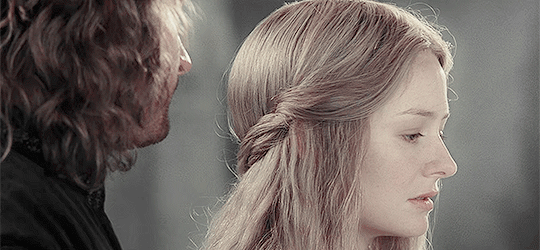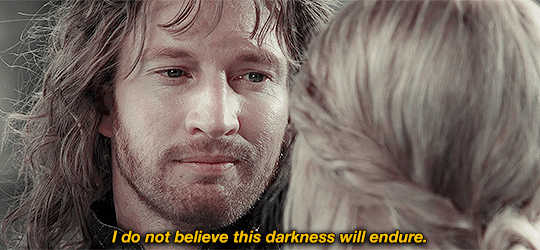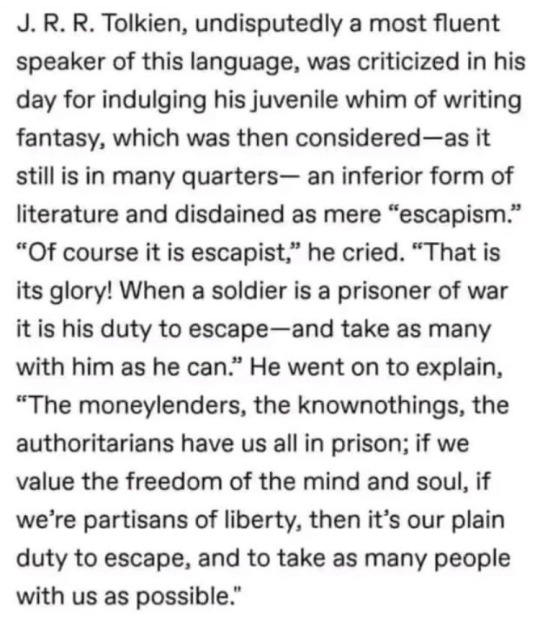Text
the feminine urge to disguise yourself as a man and ride to minas tirith to die in battle with honour
2K notes
·
View notes
Text
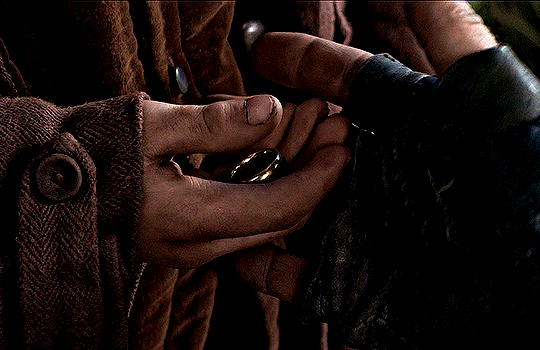

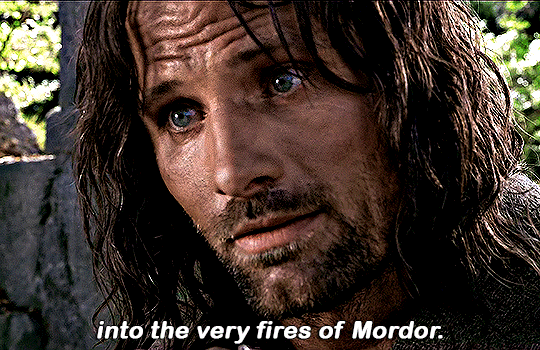
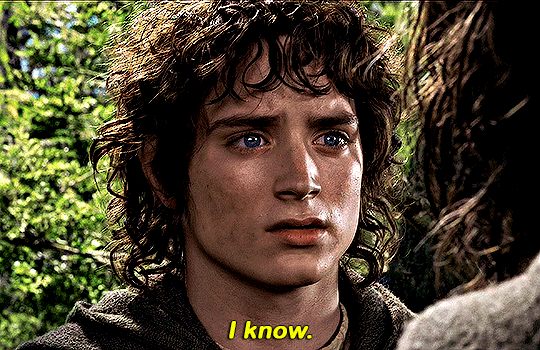
THE FELLOWSHIP OF THE RING
2001 | dir. Peter Jackson
1K notes
·
View notes
Text
I was thinking about Aragorn’s stupidly long legs again and I think it should be canon that he regularly smacks his forehead into low door frames and stuff. Just somwhere in Minas Tirith there’s a loud thunk followed by a long string of Sindarin swearwords and Arwen is like “ah yes, here he comes, the King of Gondor and Arnor, the love of my life.”
3K notes
·
View notes
Text
Míriel and Fëanor parallels
I’ve been rereading HoMe and The Silmarillion and there are so many interesting parallels between Míriel and Fëanor. When I look at all of these quotes side by side, it really emphasizes just how similar the two of them were, and also how heartbreaking it is that they never really knew each other.
Skill of hand: Míriel’s ‘chief talent, however, was a marvellous dexterity of hand’ (The Shibboleth of Fëanor) and ‘her hands were more skilled to fineness than any hands even among the Noldor’ (Morgoth’s Ring). Fëanor ‘became of all the Noldor, then or after, the most subtle in mind and the most skilled in hand’ (The Silmarillion).
Swiftness: Míriel’s embroidery was ‘achieved in what even the Eldar thought a speed of haste’ and ‘she spoke swiftly and took pride in this skill’ (The Shibboleth of Fëanor). Fëanor worked ‘ever swiftly and alone’ and ‘seldom were the hands and mind of Fëanor at rest’ (The Silmarillion).
Skill with language: Míriel ‘had a beautiful voice and a delicate and clear enunciation’ (The Shibboleth of Fëanor). Fëanor became one of the greatest linguists and loremasters of the Noldor (The Shibboleth of Fëanor, The War of the Jewels) and ‘in his youth, bettering the work of Rúmil, he devised those letters which bear his name, and which the Eldar used ever after’ (The Silmarillion).
Pronunciation: Míriel ‘adhered to the pronunciation þ…and she desired that all her kin should adhere to it also, at the least in the pronunciation of her name’, and Fëanor ‘insisted that þ was the true pronunciation for all who cared for or fully understood their language’ (The Shibboleth of Fëanor).
Inventions: By Míriel ‘was the craft of needles devised’ (Morgoth’s Ring), and Fëanor created the tengwar (The Silmarillion), Fëanorian lamps (Unfinished Tales), and the palantíri (it says this in the index of names in The Silmarillion, and is implied in The Two Towers). He also created crystals ‘wherein things far away could be seen small but clear, as with the eyes of the eagles of Manwë’, (The Silmarillion). And, of course, the Silmarils.
Their greatest work: Míriel, dwelling in the house of Vairë, received ‘all tidings of the Noldor down the years from their beginning…and she wove them in webs historial, so fair and skilled that they seemed to live, imperishable, shining with a light of many hues fairer than are known in Middle-earth’ (Morgoth’s Ring), and Fëanor ‘pondered how the light of the Trees, the glory of the Blessed Realm, might be preserved imperishable. Then he began a long and secret labour…and at the end of all he made the Silmarils’ (The Silmarillion).
Stubbornness: Míriel ‘could show an ultimate obstinacy that counsel or command would only make more obdurate’ (The Shibboleth of Fëanor). Fëanor was the same: ‘few ever changed his courses by counsel, none by force’ (The Silmarillion).
Making their words a law unto themselves: Vairë says that Míriel is ‘one of those who having said this will I do make their words a law irrevocable unto themselves’ (Morgoth’s Ring). And Fëanor is known for doing exactly this: ‘Then Fëanor swore a terrible oath. His seven sons leapt straightway to his side and took the selfsame vow together, and red as blood shone their drawn swords in the glare of the torches. They swore an oath which none shall break, and none should take, by the name even of Ilúvatar, calling the Everlasting Dark upon them if they kept it not’ (The Silmarillion).
This last parallel is just amazing to me. It’s so chilling. Vairë’s words about Míriel literally foreshadow the Oath of Fëanor. It’s really interesting that Míriel and Fëanor have so many positive similarities—such as their creative and linguistic skills and their great achievements—but they also share the same fatal flaw.
On the subject of their achievements, the line about Míriel’s weaving being ‘imperishable’ and ‘shining with a light of many hues’ strikes me as being so similar to the Silmarils that it cannot be a coincidence. Although this line describes what she created in the Halls of Mandos, her work must have been just as beautiful when she was alive, and it seems very likely that her tapestries were at least part of Fëanor’s inspiration to create the Silmarils.
I also think there’s a more subtle connection. I always thought it was interesting that Fëanor was striving to preserve the light of the Two Trees despite having no way of knowing they would be slain, and I think there is a connection between that and the loss of his mother. For most of his life, Fëanor was the only Elf born in Aman who knew the grief of losing a parent, and she died in a way that neither the Eldar nor the Valar understood. I think that this profound loss must have influenced his desire to preserve something like the light of the Two Trees so it could never disappear.
311 notes
·
View notes
Text
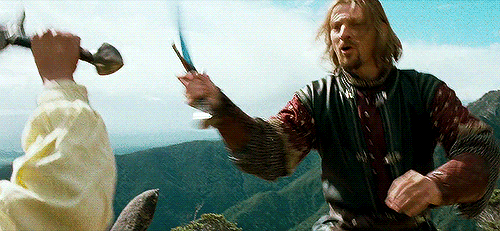


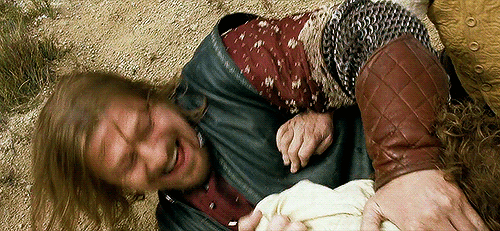
The Lord of the Rings: The Fellowship of the Ring (2001)
1K notes
·
View notes
Text
Today I listened to Nightfall in Middle-earth for the first time in a long time, and it was AMAZING. HOW DID THEY DO IT? WHAT WOULD I DO WITHOUT THIS ALBUM?
20 notes
·
View notes
Text

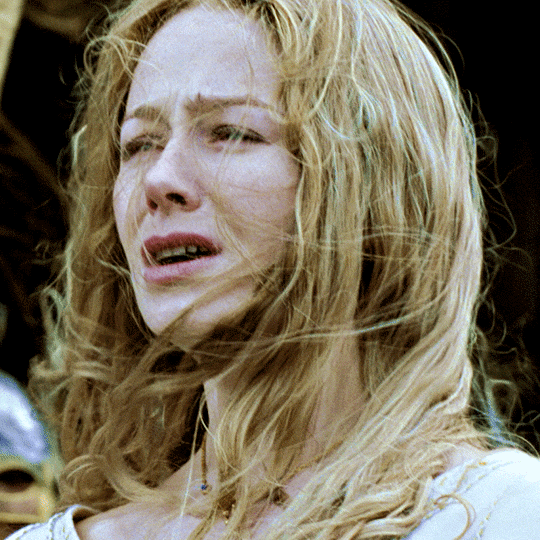
Miranda Otto as Éowyn of Rohan
THE LORD OF THE RINGS: THE TWO TOWERS
2002 | dir. Peter Jackson
986 notes
·
View notes
Text

The fearsome stronghold of Barad-dûr! No, wait…
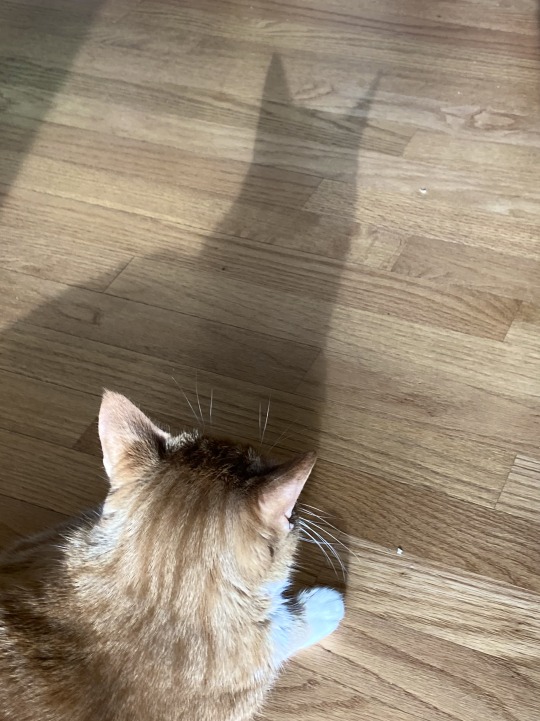
That’s just my cat’s little triangle ears.
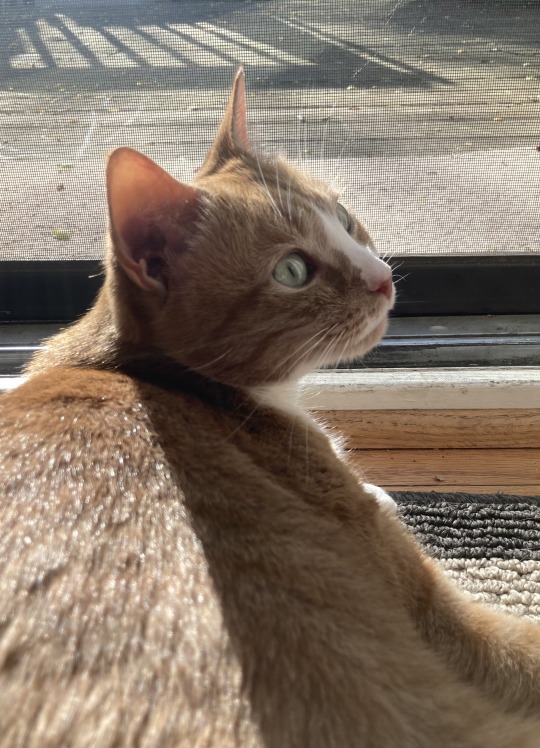
The Dark Lord herself <3
177 notes
·
View notes
Text
Someone asked me to expand a little on a topic that was buried down in a big chain of reblogs, so I'm doing that here--it's about the use of the archaic "thee", "thou", "thy", etc. in LOTR and what it tells you about characters’ feelings for one another. (I am NOT an expert on this, so it's just what I've picked up over time!)
Like many (most?) modern English speakers, I grew up thinking of those old forms of 2nd person address as being extra formal. I think that's because my main exposure to them was in the Bible ("thou shall not...") and why wouldn't god, speaking as the ultimate authority, be using the most formal, official voice? But it turns out that for a huge chunk of the history of the English language, "thee," "thou," and "thy" were actually the informal/casual alternatives to the formal "you", “your”, “yours”. Like tú v. usted in Spanish!
With that in mind, Tolkien was very intentional about when he peppered in a "thee" or a "thou" in his dialogue. It only happens a handful of times. Most of those are when a jerk is trying to make clear that someone else is beneath them by treating them informally. Denethor "thou"s Gandalf when he’s pissed at him. The Witch King calls Éowyn "thee" to cut her down verbally before he cuts her down physically. And the Mouth of Sauron calls Aragorn and Gandalf "thou" as a way to show them that he has the upper hand. (Big oops by all 3 of these guys!)
The other times are the opposite--it's when someone starts to use the informal/casual form as a way to show their feeling of affection for someone else. Galadriel goes with the formal "you" all through the company's days in Lórien, but by the time they leave she has really taken them to heart. So when she sends them a message via Gandalf early in the Two Towers, she uses "thee" and "thou" in her words to Aragorn, Legolas and Gimli because now they're valued friends and allies. And--this is the big one, folks, that was already alluded to in my previous post--Éowyn starts aggressively "thou"ing Aragorn when she is begging him to take her along as he prepares to ride out of Dunharrow. She is very intentionally trying to communicate her feelings to him in her choice of pronoun--an "I wouldn't be calling you "thee" if I didn't love you" kind of thing. And he is just as intentionally using "you" in every single one of his responses in order to gently establish a boundary with her without having to state outright that he doesn't reciprocate her feelings. It's not until much later when her engagement to Faramir is announced that Aragorn finally busts out "I have wished thee joy ever since I first saw thee". Because now it is safe to acknowledge a relationship of closeness and familiarity with her without the risk that it will be misinterpreted. He absolutely wants to have that close, familiar relationship, but he saved it for when he knew she could accept it on his terms without getting hurt.
So, you know, like all things language-based...Tolkien made very purposeful decisions in his word choices down to a bonkers level of detail. I didn’t know about this pronoun thing until I was a whole ass adult, but that’s the joy of dealing with Tolkien. I still discover new things like this almost every time I re-read.
2K notes
·
View notes
Text
you QUOTE Silmarillion? you quote Silmarillion like the epic? oh! oh! chills for reader! chills for reader for One Thousand Years!
463 notes
·
View notes
Text
Bonus internet points will be awarded to anyone who actually tries this exercise before voting.
Assume you need to get the spelling at least somewhat close, and if a character has multiple names, only one counts. Also, if a character doesn't have a canonical name, I'm sorry, but "that guy's wife" doesn't count.
For reference, if you can name the 9 members of the Fellowship, the eponymous Hobbit and his 13 dwarf buddies, 3 prominent women, and the guy who runs the Rivendell B&B, that's 27 characters right there. And you probably also know the name of a dragon.
For further reference, Tolkien Gateway has 637 (!!) pages dedicated to Third Age characters. (Don't click that link until you've voted, of course)
Edit: Your humble pollmaker gave this a try, and got as far as 73 before deciding she was too tired to keep trying to remember dwarf and Silm names. If you also want to share (and don't mind people being incredulous at your having forgot ____), pastebin allows you to paste text and share it for free. :)
2K notes
·
View notes
Text
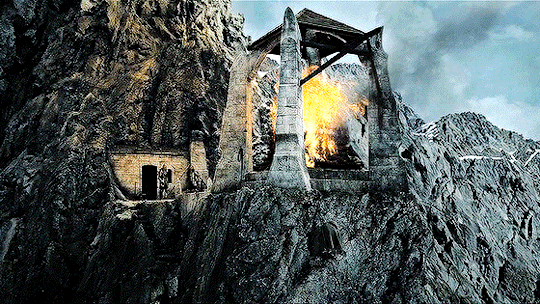







ROTK ANNIVERSARY WEEK | Hope [6/7] ➼ "Hope is kindled."
2K notes
·
View notes
Text
WHEN will people stop putting ROP gifs in the lotredit tag ???
148 notes
·
View notes
Text
y'know. i have yet to see a Polynesian- or other Pacific Islander-influenced interpretation of the falmari and I feel like there's a lot of untapped potential there
20 notes
·
View notes
Text
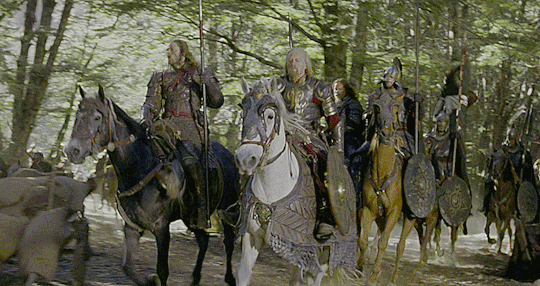


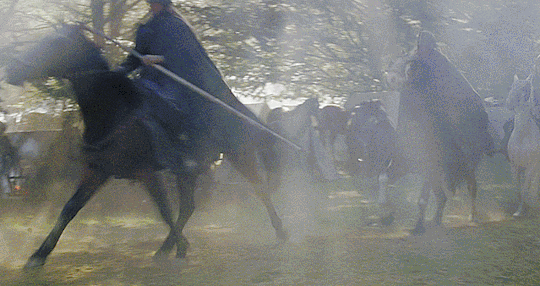
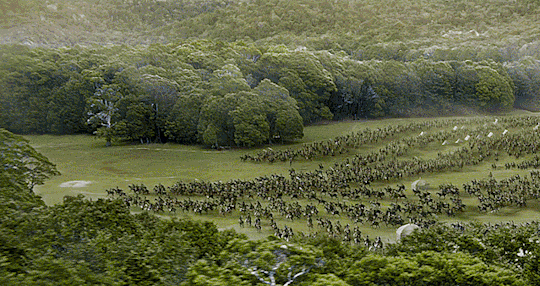
Rohan rides for Gondor 4k
175 notes
·
View notes




